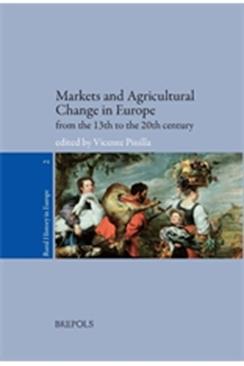Publications | Rural History in Europe
Markets and Agricultural Change in Europe from the 13th to the 20th century
The main target of this book is to explore how the involvement of rural populations and communities in different kinds of markets (mainly for agricultural commodities) has influenced the management of rural land in Europe. Most of the papers focus on precisely what were the forces driving agricultural change in rural Europe. Although the importance of these changes were very different from the Middle Ages until the present days, a common approach that emerged was to stress the importance of urban and external markets in order to give incentives to changes in the management of rural land. The transition of agriculture and its producers, respectively, into a highly market-integrated sector and strongly market-oriented peasants formed the driving force and prima causa of European agricultural revolutions during early modern times. Expansion of market allowed for an intense process of specialization, with clear competitive advantages with respect to earlier land uses.
LIST OF CONTRIBUTORS
Maria Isabel AYUDA, University of Zaragoza, Spain
Marc BADIA-MIRO, Universität Oberta de Catalunya, Spain
Xavier Cusso, Autonomous University of Barcelona, Spain
Ramon GARRABOU, Autonomous University of Barcelona, Spain
Michael KOPSIDIS, Leibniz Institute of Agricultural Development in Central and Eastern Europe (Iamo),Germany
Mais OLSSON, Lund University Sweden
Ann-Catrin ÒSTMAN, Abo Akademi University, Finland
Vicente PINILLA, University of Zaragoza, Spain
José Vicente SERRÀO, Institute Superior de Ciëncia do Trabalho e da Empresa (ICSTE), Lisboa, Portugal
Patrick SVENSSON, Lund University, Sweden
Enric TELLO, University of Barcelona, Spain
Isabelle THEILLER, University of Paris Diderot – Paris VII, France
Aud MIKKELSEN TRETVK, Norwegian University of Science and Technology, Norway
 Actualités
Actualités
Les intermédiaires dans la relation de travail dans les sociétés esclavagistes et post-esclavagistes, XVe siècle à nos jours
 Appel à communication - Samedi 1 mars 2025 - 18:00ArgumentaireDans la vaste question du travail contraint et forcé, les intermédiaires, placés à l’intersection des statuts de libre, d’esclave ou d’engagé, jouent un rôle central, quoique relativement négligé par l’historiographie. Ce numéro 'Esclavages & post~esclavages / Slaveries & Post~Slaveries (n°13, 2026, CIRESC), dirigé par Alessandro Stanziani (GRHEN), propose d’exposer leurs situations dans le long terme, du moment de la traite à cel(...)
Appel à communication - Samedi 1 mars 2025 - 18:00ArgumentaireDans la vaste question du travail contraint et forcé, les intermédiaires, placés à l’intersection des statuts de libre, d’esclave ou d’engagé, jouent un rôle central, quoique relativement négligé par l’historiographie. Ce numéro 'Esclavages & post~esclavages / Slaveries & Post~Slaveries (n°13, 2026, CIRESC), dirigé par Alessandro Stanziani (GRHEN), propose d’exposer leurs situations dans le long terme, du moment de la traite à cel(...)
Hugo Souza de Cursi, lauréat de la bourse d'aide à publication de l'IDA 2024
Prix et distinctions -L’ appel à publication de thèses lancé par l’Institut des Amériques (IDA) a vocation, chaque année, à attribuer une aide financière à de jeunes docteurs en sciences humaines et sociales dans le cadre de projets de publication de leur thèse. Les thèses récompensées abordent des thématiques en lien avec les Amériques.Parmi les trois projets retenus dans le cadre de l’appel lancé par l’IDA pour l’année 2024, et soumis à l’acceptation définitive des Presses universitaires d(...)
Prix de la pensée européenne 2024
Prix et distinctions -Le premier prix de la pensée européenne, créé par des intellectuels engagés, a été remis le 16 mars 2024 à Conques, dans l’Aveyron. L’objectif est de promouvoir un idéal démocratique européen qui réponde aux enjeux environnementaux et sociaux du monde.Associé à un colloque de fond "Le réveil de la pensée européenne ?" qui sest déroulé les 16 et 17 mars au Centre européen de Conques (retransmis en direct avec Philosophie Magazine), et présidé par le philosophe Dominique(...)
ERHIMOR
EHESS-CRH
54 boulevard Raspail
75006 Paris
Tél. : +33 (0)1 49 54 24 42
ou : +33 (0)1 49 54 25 74
Fax : +33(0)1 49 54 23 99
Dernière modification :
18/04/2018



